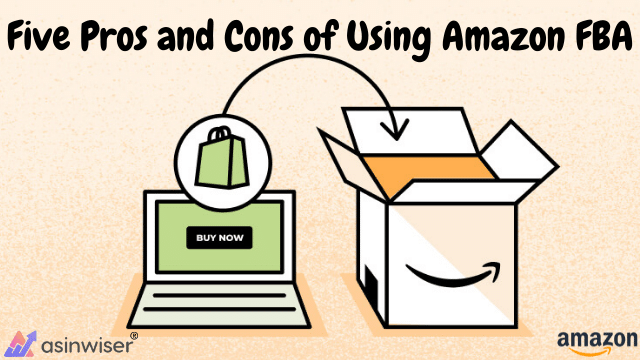
Five Pros and Cons of Using Amazon FBA
In 2006, Amazon decided to launch Fulfillment by Amazon (Amazon FBA); to empower sellers. With this launch, Amazon took off the burden of the store, picking, packing, and shipping their customer’s orders from the seller’s shoulders. However, it is a paid service that gives Amazon sellers access to Amazon’s fulfillment network and services.
While every business possesses different needs and requirements, Amazon FBA is often the preferred choice which does have some cons. So if you are thinking of becoming an FBA wholesale seller, read on to find out the pros and cons of using Amazon FBA.
Pros of FBA
Amazon’s FBA program has lots of pros which can be extremely helpful for sellers.
• Prime Benefit
When a seller opts for Amazon FBA, the listed products qualify for Amazon Prime shipping. Amazon Prime itself is a huge sales motivator offering two days free delivery of the order. Also, a seller doesn’t need to pay any additional cost to be a prime seller.
If a product is available with two sellers, one is an FBA seller, and the other is regular, the sale will go to the FBA seller.
• Storage Space
With FBA, a seller doesn’t have to be concerned about the storage as Amazon allows you to store inventory with no minimum quantity of units at the Amazon fulfillment center. And when an order is placed, the product will be shipped from the fulfillment center nearest. Everything from packing to shipping, even after delivery services, is taken care by Amazon
• Stellar Customer Service
Amazon’s stellar customer service is what makes it the most reliable eCommerce website. Amazon’s 24/7 customer service team manages customer inquiries, refunds, and returns for Amazon FBA orders and takes a load off the seller’s shoulder. ‘Fulfillment by Amazon logo’ displayed on product listings handles packing, delivery, customer service, and returns.
• Cost Effective Shipping Rate
Costly and fluctuating shipping prices could be the biggest turnoff to potential customers. Believe it or not, no customers want to pay a single extra penny for shipping. Don’t bother yourself with confusing rules and regulations and shipping modes.
• Multi Channel Fulfillment
Multi Channel Fulfillment of Amazon meets orders needs from other sales channels using seller’s inventory stored in Amazon fulfillment centers. Multichannel retailing is a common strategy that targets customers on various channels to increase sales opportunities. Amazon FBA is taking the necessary measures to help FBA sellers completely optimize the benefits of FBA by providing access to Amazon’s Multi-Channel Fulfillment (MFC) feature.
Cons of FBA
Just like a coin has two sides, every business model has its pros and cons. Now that we have talked about the pros of FBA, it’s our moral duty to enlighten you about the cons of FBA.
• Amazon FBA Fee
FBA fees deduct the seller’s profit margin. There are also different fees for storage, packaging, shipping, listing, and whatnot. For those sellers who are striving to start their business, money is significant. Also, FBA is not meant for low-cost products because of the way the fee is calculated. Luckily, Amazon has an FBA profit calculator that can assist sellers in learning whether FBA is profitable for them or not.
• Inventory Organization
Organizing inventory is an arduous task. But using FBA is more challenging to manage stock. Though FBA is just like any other warehouse operation, if the seller has hundreds and thousands of products in Amazon FBA, not all of them will sell.
• Rigours Barcode System
Amazon has a rigorous ASIN/UPC system. Sellers have to label every product individually, pack them up into multiple shipments that go to Amazon’s various warehouses, and send them off. Sellers are accountable for delivering inventory to Amazon’s warehouses, but that can be a problem.
• More Returns
Amazon handles the processing, while Amazon used to have returns shipped back to them. The seller would have to arrange to have them then forwarded to the customer. Amazon makes modifications that will enable returns to go directly back to your facility. Prime customers see easy returns as one of the benefits they’re entitled to; they tend to take advantage of it far more often.
• Sales Tax
Sales tax is generally managed at the is state level. If the product warehouse in a different state. Fortunately, there are tools to automate different tax situations and rules to aid you in figuring out what to charge, and Amazon can manage this for sellers.
Conclusion
While using Amazon, FBA can be a beneficial choice to streamline operations. But if a seller wishes to grow his business, improve customer support and in multiple marketplaces or simplify things for yourself, FBA might be worth another look.
Having an intelligent software tool—Asinwiser—for online sellers will assist you to run your business in the right direction. Asinwiser.com is an excellent solution that will help you to target your potential audience with its all-in-one features such as brand story, product research, competitor research, profitability calculator, fba calculator and so on.
- Tags: Amazon FBAamazon seller
Share this:
Subscribe to Our Newsletter
Recent Post
- Top 13 Amazon Inventory Management Tools for FBA Sellers in 2023
- Asinwiser: The Ultimate OMSGuru Alternative for Amazon Sellers
- Repricer.com Alternative: Why Asinwiser is the Superior Choice for Amazon Sellers
- Aura Alternative: Why Asinwiser is the Superior Choice for Amazon Repricing
- Maximize Amazon Sales with Asinwiser: The Superior Amazon Repricer & Revenue Analytics Tool
